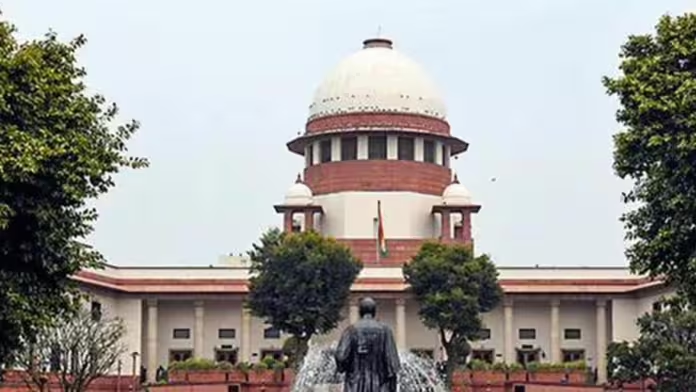The Supreme Court of India, in a landmark ruling on Thursday, reinforced that public recruitment rules cannot be altered once the recruitment process has commenced, except where provisions specifically allow such changes. This decision, delivered by a five-judge bench led by Chief Justice of India (CJI) D.Y. Chandrachud, has set a clear precedent in public employment law, confirming the Court’s earlier stance in the 2008 K Manjusree vs State of Andhra Pradesh case.
Recruitment Rules Fixed Once Process Starts; Says Supreme Court.
The ruling clarified that the recruitment process begins with the issuance of an advertisement calling for applications and concludes once the vacancies are filled. According to the Court, this implies that the eligibility criteria established at the onset of recruitment must remain fixed throughout the process unless specific provisions in the recruitment rules permit modifications. This safeguard, the Court emphasized, aims to ensure fairness and consistency in public recruitment practices, aligning with constitutional principles.
In the judgment, Justice Manoj Misra, writing for the bench, stated, “Eligibility criteria for being placed in the select list, notified at the commencement of the recruitment process, cannot be changed unless the extant rules so permit or the advertisement, which is not contrary to the extant rules, so permits.” Justices Hrishikesh Roy, P.S. Narasimha, Pankaj Mithal, and Manoj Misra joined CJI Chandrachud on the bench.
“Good Law”: K Manjusree Case Stands as Precedent.
The bench’s decision reaffirmed the 2008 judgment in K Manjusree vs State of Andhra Pradesh, which the Court described as “good law.” This ruling, considered a precedent, safeguards candidates from unexpected changes in selection criteria during the recruitment process. The bench also clarified that this decision does not conflict with the Court’s earlier ruling in the Subhash Chand Marwah case. While Marwah deals with a candidate’s right to appointment from a select list, the K Manjusree decision focuses on the right to be included in the select list. The bench’s statement underlined that these cases address separate issues, establishing that both rulings hold distinct and complementary value in employment jurisprudence.
By affirming the K Manjusree judgment, the Court has provided clarity and assurance to candidates that eligibility standards set at the beginning of a recruitment process will remain stable. This stance is intended to prevent arbitrary changes and uphold the principles of transparency and fairness in public sector hiring.

Changes Allowed Only if Rules Permit and Meet Constitutional Standards.
The Court acknowledged that in certain cases, amendments to recruitment criteria may be necessary. However, any such changes must align with existing rules and meet constitutional requirements for non-arbitrariness. The bench specified that, if changes are permissible under the relevant rules for a particular advertisement, those modifications must withstand scrutiny based on constitutional principles, specifically the principles of fairness and rationality.
Justice Misra, in his remarks, outlined the approach that recruiting bodies should follow, noting that recruitment procedures, while subject to applicable rules, must adopt a transparent, non-discriminatory, and rational approach in achieving their objectives. “Recruiting bodies, subject to the extant rules, may devise an appropriate procedure for bringing the recruitment process to its logical end, provided the procedure adopted is transparent, non-discriminatory, non-arbitrary, and has a rational nexus to the objective sought to be achieved,” Justice Misra explained. This statement underscores the judiciary’s expectation that recruitment agencies follow a just and logical process, strengthening confidence in public recruitment’s integrity.

What This Decision Implies for Public Recruitment Processes.
The Supreme Court’s reaffirmation of the K Manjusree case has significant implications for public employment in India. By stipulating that recruitment standards cannot change mid-process, the ruling establishes a robust framework for protecting candidates from procedural inconsistencies. For job seekers, this decision offers a guarantee that eligibility standards are upheld as advertised, creating a level playing field. It reassures candidates that their selection is based on clear and predefined standards, which is critical for ensuring justice in public employment.
Additionally, the decision implicitly mandates that recruiting bodies must draft advertisements and eligibility criteria carefully and adhere to them throughout the recruitment process. Where extant rules do not exist or lack clarity, the bench advised that administrative guidelines can serve to fill in gaps, provided they respect constitutional principles and statutory mandates.
In conclusion, this Supreme Court ruling serves as a safeguard for the integrity of public recruitment in India. The judiciary’s reinforcement of fairness, transparency, and consistency in recruitment will likely have long-term benefits for public sector employment practices. This decision reinforces the importance of adhering to constitutional standards, ultimately promoting trust and equity in the recruitment process, and signaling that procedural fairness is paramount in public employment.

